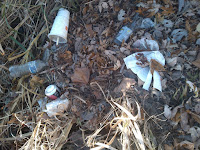"Just throw it away."
What a convenient phrase we use for disposing of our unwanted stuff. Don't need it anymore? Just throw it away. That plastic packaging for the item you just bought? Throw it away. Where is this mythical "away" to which things are being thrown?
 For many beverage containers, unfortunately, "away" is along streets and medians, where they eventually wash into the Greenway or through other stormwater systems ending up in our rivers and streams. Spend an hour picking up trash along McCollister Blvd, for example, and make note of all the cans and bottle that have recently been heaved out of vehicles. Busch Light is a favorite along this stretch, as well as a somewhat vile-looking "performance energy drink" called A SHOC. Within the Greenway itself, huge amounts of flimsy plastic water bottles and fast-food beverage cups collect near the stormwater outlets from surrounding neighborhoods.
For many beverage containers, unfortunately, "away" is along streets and medians, where they eventually wash into the Greenway or through other stormwater systems ending up in our rivers and streams. Spend an hour picking up trash along McCollister Blvd, for example, and make note of all the cans and bottle that have recently been heaved out of vehicles. Busch Light is a favorite along this stretch, as well as a somewhat vile-looking "performance energy drink" called A SHOC. Within the Greenway itself, huge amounts of flimsy plastic water bottles and fast-food beverage cups collect near the stormwater outlets from surrounding neighborhoods.
It's so easy, you see, to simply toss these beverage containers when finished with them. They are often consumed on-the-go, away from home recycle bins or convenient public receptacles. And this is not a new problem: in fact, over 40 years ago Iowa's legislators enacted a Bottle Bill that would help prevent exactly this sort of littering. But it doesn't seem to be working, does it?
Thus some legislators, backed by an extremely insistent grocery industry, feel it should be scrapped entirely. They argue that recycling is so widespread and convenient that a Bottle Bill is unnecessary. They argue that it places an undue burden on those grocery stores that have to accept the returns. They argue it is a hassle for consumers to properly dispose of the containers.
But clearly--the first point is obviously untrue. If someone can fill a trash bag full of these containers every month along just one mile of one road, these containers are not being recycled as they should be, even with readily-available programs in our city. Imagine if each of those cans and bottles were worth a quarter--an amount that would be in line with the original nickel forty years ago--would people be so eager to toss them out of their car?
Grocery stores have eagerly seized upon the pandemic as an excuse to scrap their bottle return systems whenever possible. But the Bottle Bill was an early and elegant means of putting responsibility for trash produced back onto the industries that produced it: Distributors and grocers make money selling this trash, while leaving municipal waste systems to clean it up. The deposit system ensures that the trash is collected and recycled by the very industries that produced it.
We need to move beyond a one-way stream from production to use to trash, into a modern circular system where the entire lifecycle of a product and its packaging is considered at the time of production, and all costs included in the purchase price. The Bottle Bill is an effective way to internalize the costs of these single-use containers and ensure they are collected and recycled properly.
In fact, Iowa manages to recycle 65% of its deposit containers, twice as
much as in states without deposits(1). But far less than the nearly 90%
attained by Michigan, with its 10-cent deposits. We can do better.
By no means should we be considering scrapping the Bottle Bill entirely; rather the entire country should enact a National Bottle Bill. It should include a deposit of at least 10 cents, and it should cover not only the limited products currently covered (beer, wine, liquor, soda, etc.) but should be expanded to include the materials that have exploded in usage since the Bottle Bill was first passed in Iowa--particularly water and sports drink bottles.
A national Bottle Bill is included as part of the Break Free From Plastic Pollution Act of 2021, an important piece of legislation that tackles many of the plastic waste problems that our country is facing that are only growing worse with time. You can encourage your members of Congress to support it.
There simply is no "away" when it comes to our trash.
Resources/Additional Sources:


Would love this to be nationwide.
ReplyDelete